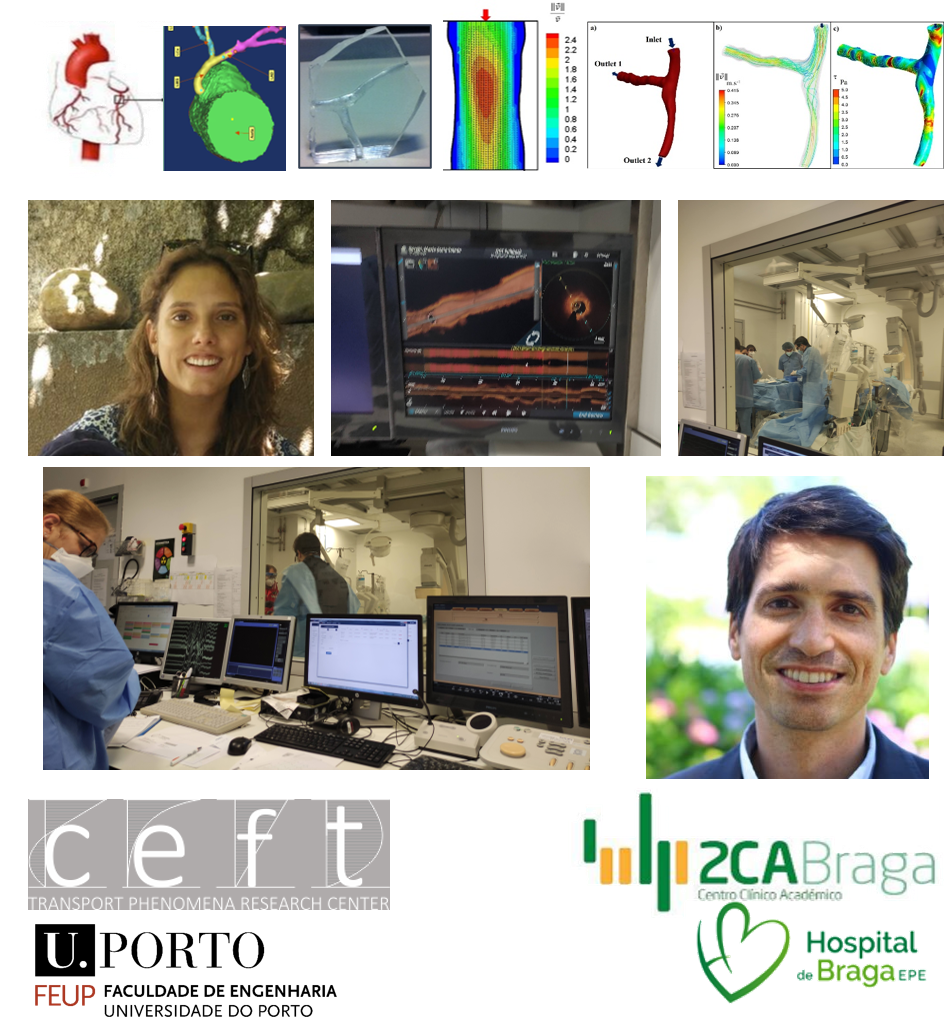R&D partners
Our R&D unit, CEFT, is glad to announce a R&D partnership with Clinical Academic Center of Braga (2CA-Braga). Erica Doutel (our PhD researcher) and Dr.Carlos Braga( Interventional Cardiologist in Cath lab of Hospital de Braga) are in charge of this partnership.
We have an emerging topic related to human circulatory system which has begun around 2008. It is focused on the left coronary artery, and the effects of geometry, blood rheology, and pulsatile flow were isolated and analysed. Experimental techniques were created to enable the analysis of the flow field using particle image velocimetry (PIV) and, simultaneously, numerical codes were developed and validated by the experimental results. We proceeded to the study of arteries with stenoses. The change in the flow field, and the effects on the wall shear stresses, were analysed, both experimentally and numerically. Afterwards, it was possible to analyse, images of coronary arteries of patients of the GAIA/ESPINHO Hospital. With this analysis, it was created a tool which has potential to assess the evolution and progression of a stenosis starting from the assumption that the field of cutaneous stresses near the walls of the artery has a strong influence on the appearance and development of areas with atherosclerosis.
The Clinic Academic Center – Braga, Association (2CA-Braga), is a non-profit partnership, be tween the University of Minho (UM), through the School of Medicine (EM) and the Life and Health Sciences Re search Institute (ICVS), and, Hospital de Braga. Founded in 2012, and headquartered at Hospital de Braga (Braga, Portugal), the 2CA-Braga has as its corporate purpose the development of clinical research, framed in an environment of health care provision, promotion and knowledge, in order to make clinical care more effective and, thus, improving the quality of assistance. 2CA-Braga’s vision is to create a paradigm shift in the health field, with the capacity to adequately monitor a larger number of individuals and health care professionals -participants in clinical research- to proactively provide for more personalized health care. Strengthening this vision, 2CA-Braga seeks to ensure that advances in medical research result in direct clinical benefits for patients.

To this end, 2CA-Braga promotes clinical research projects, translational methodologies and clinical trials, hosting scientific activities in the area of health sciences and offering services to the clinical and scientific community. The Hospital de Braga is a group II public business entity integrated in the National Health Service with a capacity up to 704 beds. It provides healthcare to approximately 1.2 million people in the districts of Braga and Viana do Castelo, combining in its facilities units of medical assistance, research, and university education. The Cardiology Department, a level II within the national cardiology referral network, has a young staff that is engaged actively in international randomized controlled trials and registries, with several publications and participations in scientific congresses. Each year, in the hospital’s catheterization laboratory, about 2500 diagnostic coronary angiograms and 900 percutaneous coronary interventions are performed, of which 300 as emergent procedures.
This R&D partnership are in line with the innovative strategy of our group. This kind of research with multidisciplinary environment will allow to discover relevant morphological and hemodynamic indicators (MHI) of coronary arteries (CA) and could help to get a deep knowledge of CAD progression. CAD is the leading cause of death worldwide and may present in its most severe forms as acute myocardial infarction, sudden death, or heart failure.
CEFT & 2CA-Braga share a mission relating CAD progression and it is consider to be of the utmost importance, in order to develop a strong, long-lasting multidisciplinary research partnerships, that we believe will bring out the best of a symbiotic relationship between engineering and medicine.
In this way, as a R&D partners we must provide, share and looking for national and international research funds or in-kind contributions which may include access of clinical data, services, facilities, equipment, intellectual property or other resources, where all ethical issues of both parts must be respected.
